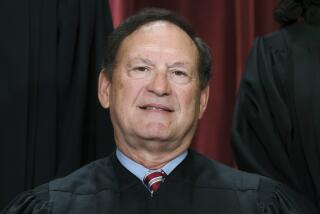Baker Asking for Waiver of Ethics Rules
- Share via
OTTAWA — Secretary of State James A. Baker III confirmed Friday that he is asking the White House to waive government ethics rules that otherwise might force him to sell his large holdings in bank stocks, but said that he will abide by the White House counsel’s decision on the matter.
Baker denied, however, that the counsel, C. Boyden Gray, has been pressing him to sell his holdings in Chemical New York Corp., a bank holding company with more than $4 billion in loans to Third World nations.
“He (Gray) raised that as an option . . . but he did not say that it was required,” Baker told reporters after a meeting here between President Bush and Canadian Prime Minister Brian Mulroney.
Aides said that Baker is privately incensed that his willingness to comply with ethics rules has been questioned. “This man is clean as a hound’s tooth, always has been,” one aide said.
The question was first raised by an article Friday in the Washington Post, which reported that Gray has been pressing Baker to divest himself of the Chemical Bank holdings.
At issue is a new, more stringent interpretation of existing ethics rules, which require officials to avoid making policy decisions that could affect their own investments.
As secretary of the Treasury from 1985 until 1988, Baker put his stocks in a “qualified blind trust,” meaning that he had no direct control over the holdings although he generally knew what they were. He also formally recused himself from any policy decisions that would directly affect the companies he held.
In 1987, the Justice Department issued a new interpretation of those rules that require officials to avoid making decisions that could affect their holdings in a general way, not necessarily as specific companies. A strict application of that broad rule could force Baker--and many other officials--to sell a wide range of their investments, Baker aides said.
Baker said he supports Bush’s emphasis on higher standards for ethics in government. “The President has made it very clear that ethics are a very important issue for him,” he said.
Waiver by Employer
Nevertheless, he said that he hopes Gray will issue a waiver in his case to allow him to retain his bank stocks. The law allows an official’s employer--in Baker’s case, Bush--to issue such a waiver if he finds the stock holdings are not likely to influence policy decisions.
Baker said that lawyers at the White House, the State Department and the Office of Government Ethics are still considering the proper course of action.
“Once those discussions are over and a determination has been made, that’s when I will be faced with an obligation to take some action one way or the other,” Baker said.
Baker made it clear, however, that he wants to avoid selling the bank stock and said that he would consider several courses of action if Gray rules against granting a waiver.
“There are a number of additional mechanisms that could be considered, ranging from recusals to creation of a different kind of trust,” he said. “I have a qualified blind trust. I could consider creating a diversified blind trust; I could consider a waiver. The discussions now revolve around waiver.”
Since Baker’s holdings have not been made public, it is not known how much of his wealth is in Chemical Bank stock. If he were required to sell the stock abruptly, he would have to pay a substantial cost in capital gains taxes.
More to Read
Get the L.A. Times Politics newsletter
Deeply reported insights into legislation, politics and policy from Sacramento, Washington and beyond. In your inbox twice per week.
You may occasionally receive promotional content from the Los Angeles Times.











